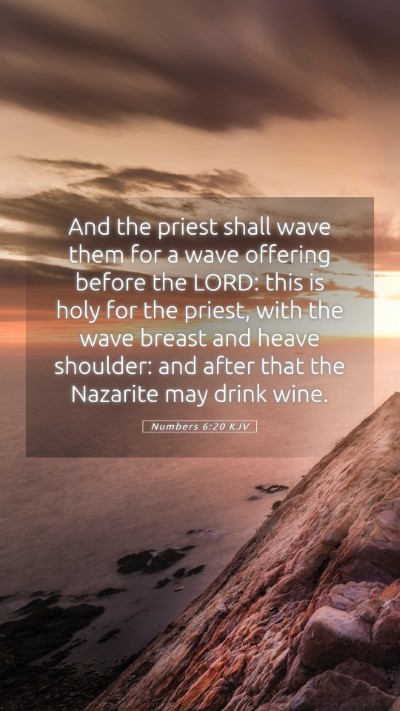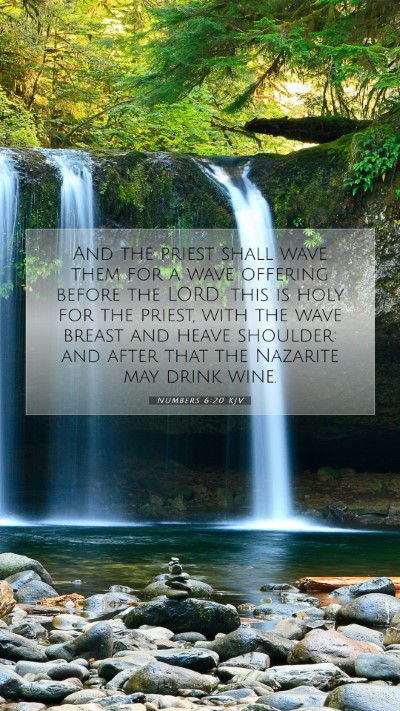Understanding Numbers 6:20
Numbers 6:20 states: "And the priest shall wave them for a wave offering before the Lord: this is holy for the priest, with the wave breast and the heave shoulder: and after that the Nazarite may drink wine."
This verse forms part of the instructions regarding the Nazarite vow, which is a special commitment to God for a period of time defined by specific rituals and abstentions. The significance of this verse can be analyzed through various perspectives provided in public domain commentaries such as those by Matthew Henry, Albert Barnes, and Adam Clarke.
Key Insights from Commentaries
-
Matthew Henry's Commentary:
Henry emphasizes the importance of the offerings in the context of the vow of the Nazarite, noting that the waving of the offerings signifies presentation and acceptance before God. The offerings are a testament to the holiness associated with the priestly duties and the commitment the Nazarite has made to God. The ritualistic actions serve to illustrate the seriousness and the sacred nature of the commitments made under the Nazarite vow.
-
Albert Barnes' Notes:
Barnes elaborates on the ceremonial aspects, detailing how the wave offering represents the transferring of property to God through the priests. This sacred act symbolizes the acknowledgment of God as the source of all that one possesses. Furthermore, the allowance for the Nazarite to resume drinking wine after their offerings illustrates the concept of returning to a normal state following a period of consecration, thus allowing for a balance between holiness and everyday life.
-
Adam Clarke's Commentary:
Clarke discusses the significance of the wave offering in relation to atonement and blessing. He points out that the waving of the offerings before the Lord was intended to express gratitude and dedication. It serves not only to consecrate the gifts but also the priest's role, highlighting that the priest acts as an intermediary between God and the Nazarites. The permission granted to drink wine after the offerings indicates a return to the ordinary, while still maintaining a connection to the divine through the consecration process.
Historical Context
The Nazarite vow is a distinctive feature of the Mosaic law, rooted in a desire for heightened spiritual commitment. It is characterized by making pledges, such as abstaining from wine and cutting one’s hair, reflecting a deep dedication to God. By examining Numbers 6:20, readers can see the fulfillment of priestly duties related to this vow, which were essential in reinforcing community commitments to holiness.
Theological Implications
This verse illustrates a continuum between sacred and secular life. The fact that after fulfilling the ritual the Nazarite may return to drinking wine conveys a divine acceptance of regular life after a sacred period. This highlights a significant principle in theological study - the harmony between devotion to God and living in the world.
Applications in Daily Life
Incorporating the meanings derived from Numbers 6:20 into everyday life may involve understanding one's commitments to God and how sacred rituals or practices influence everyday decisions. This can promote reflection within Bible study groups as participants consider the balance between spiritual dedication and daily responsibilities.
Additional Biblical Cross References
- Judges 13:5: Discusses the vow of the Nazarite through the birth of Samson, emphasizing the lifelong dedication to God.
- 1 Samuel 1:11: Hannah's vow to dedicate her son to the Lord reflects a personal commitment similar to that of the Nazarite vow.
- Acts 18:18: Paul takes a Nazarite vow, demonstrating the continued relevance of such practices in the New Testament era.
Conclusion
This examination of Numbers 6:20 reveals profound insights into the nature of holy commitments and the interactions between believers and God as facilitated by priestly roles. The verse encourages believers today to seek a deeper understanding of their commitments, both in communal worship and personal devotion.
In groups or individual studies, such as online Bible study or various Bible study resources, this verse can spark discussions on the importance of Bible verse explanations and applying biblical teachings in a modern context.


